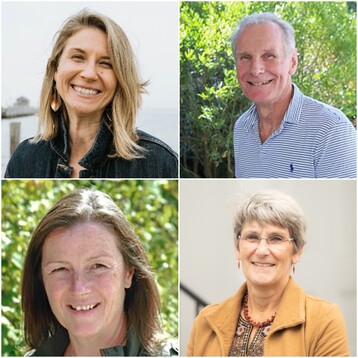Social Services Advocates Launch New Non-Profit: Nantucket Resource Partnership
Jason Graziadei •


A new non-profit has formed to connect and streamline social services on Nantucket, and it’s launching an immediate effort to tackle the vexing issue of food insecurity on the island.
The Nantucket Resource Partnership has been founded by Tracy Nichols, Pauline Cronin, Brian Lenane and Brooke Mohr to “develop community-wide systems that will enhance the provision of social services on Nantucket.” The organization will soon have a mid-island office, and plans to hire a director by July.
"It’s important work and it's happening," Nichols said. "I'm excited for what's to come."
Such an entity has long been considered a goal for the island's social services agencies, which all excel in their individual missions, but have found collaboration and building a network to be challenging.
"That has been the dream," Mohr said. "When something happens and you're in crisis, to have the opportunity to tell your story once and get the help you need and have someone tell you what’s available to you. To me, this is the physical manifestation of what we want ourselves to be as a community: loving and caretaking of each other."
The new organization is starting its work with an effort to bolster food security on Nantucket. Nantucket Resource Partnership’s first program, Nourishing Nantucket, will be a collaboration with island grocer Pip & Anchor - which kickstarted the program with its “Send-It” boxes last year - along with the Nantucket Food Pantry, the public schools and more than a dozen other human service organizations. Nourishing Nantucket aims to provide a boxes full of fresh, local food to community members experiencing food insecurity, supplementing and complementing the island's existing program through the Food Pantry.
For Pip & Anchor co-founder Chris Sleeper, the collaboration with NRP will allow the new business to expand on its "Send-It" boxes and realize its goal of bringing access to healthy food for everyone in the island community.
"With NRP, what’s amazing about them is they’re the coordination that’s been missing in the community," Sleeper said. "There are so many amazing non-profits doing great things. The problem we’ve run into with this program and trying to grow it, no one has the bandwidth to do it. The problems were identified by non-profits that do have relationships with people in the community, but pointing then in the right direction can be difficult when it comes to food insecurity, and what one person may need might be different for the next."
The goal, Sleeper said, is to reduce food insecurity on the island by 50 percent over the next two years.
"The reason why we think we can do it is we have the capacity to do 150 boxes, which is 150 families which is nearly 450 people," Sleeper said. "We have the infrastructure and organization to do it. It's just a matter of connecting the dots and the non-profit funds."
The NRP cites data from Nantucket Public Schools that “over 40% of their student body qualifies for free or reduced lunch. That program is based on federal guidelines and doesn’t account for the local cost of living – meaning the true number of food insecure kids is far higher. Food insecurity has a demonstrated negative impact on the performance and behavior of children and teens.”
The increasing food insecurity on Nantucket was laid bare during the pandemic. For the first time last year, Nantucket Cottage Hospital identified food insecurity in its triennial community health needs assessment. It noted that “Nantucket county was identified as one of four counties that have seen their projected food insecurity rates increase by over 70.0%.”
With its partners, including Process First, Nantucket Resource Partnership intends to build an integrated system “to nourish this community” and use the Nourishing Nantucket program as a model to integrate access to other human services on the island.
"We want to build systems to move food," Nichols said. "And we're not just thinking about food but all the social services and access. To start we're trying to pick one piece and build that out, making sure it's sustainable as framework to build on top of. That's the fusion of Process First's skill set and their experience of what they’ve built with tech and systems, and our vision for overarching support."